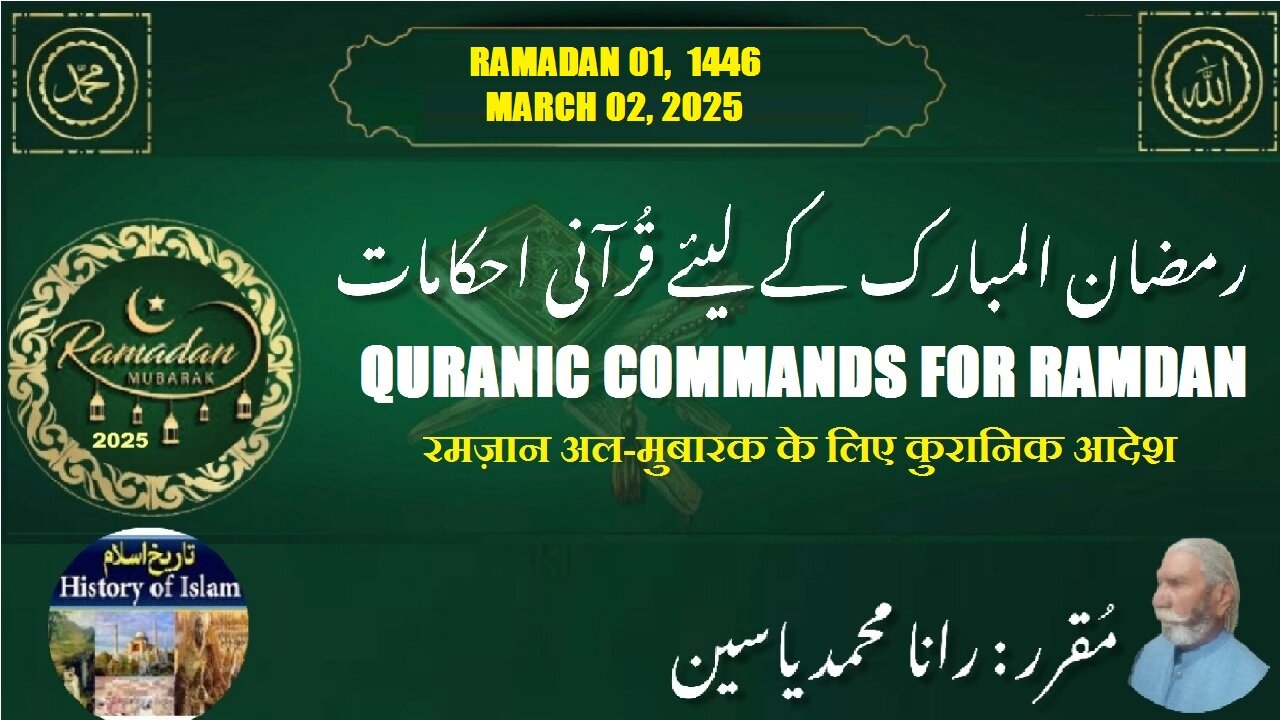Premium Only Content

What are Quranic commands for Ramdan Al-Mubarak رمضان المبارک کے لیے قرآنی احکام کیا ہیں؟
@islamichistory813 #ramadan2023 #spiritual #journey #community #unity #ramadan #blessings #faith #reflection #cultural #traditions #ramadan #reflections #spiritual #awakening
What are the commands in Quran about Ramdan Al-Mubarak?
Asslamoalaikum sisters, Brothers, Friends and elders, This video will be provides an in-depth analysis of the Quranic commands related to Ramadan Al-Mubarak. We will discuss the importance of fasting, prayer, and charity during this blessed month, as well as the spiritual and communal aspects emphasized in the Quran. Gain a deeper understanding of how these teachings shape the observance of Ramadan for Muslims around the world.
Ramadan Al-Mubarak is the holiest month in the Islamic calendar, during which fasting is prescribed for all adult Muslims. The Quran provides clear guidance regarding the significance, rules, and benefits of fasting during Ramadan. Additionally, Hadith literature elaborates on these commands, providing deeper insights into how Muslims should observe this sacred month.
The fundamental command regarding fasting in Ramadan is given in the Quran in Surah Al-Baqarah (2:183-185):
"O you who have believed, decreed upon you is fasting as it was decreed upon those before you that you may become righteous." (Quran 2:183)
This verse establishes fasting as an obligatory act of worship for Muslims, highlighting that it is not a new practice but was also ordained for previous nations. The purpose of fasting is to attain taqwa (piety and God-consciousness).
"[Fasting for] a limited number of days. So, whoever among you is ill or on a journey—then an equal number of days [are to be made up]. And upon those who can fast with hardship—a ransom [as a substitute] of feeding a poor person. And whoever volunteers excess—it is better for him. But to fast is best for you, if you only knew." (Quran 2:184)
This verse provides exemptions for fasting, allowing ill individuals and travelers to make up for missed fasts later. It also mentions the provision of feeding a poor person as an alternative for those unable to fast due to valid reasons.
"The month of Ramadan [is that] in which was revealed the Quran, a guidance for the people and clear proofs of guidance and criterion. So, whoever sights [the new moon of] the month, let him fast it; and whoever is ill or on a journey—then an equal number of days [are to be made up]. Allah intends for you ease and does not intend for you hardship and [wants] for you to complete the period and to glorify Allah for that [to] which He has guided you, and perhaps you will be grateful." (Quran 2:185)
This verse highlights the significance of Ramadan as the month in which the Quran was revealed. It reinforces the obligation of fasting while reaffirming exemptions for those who are sick or traveling.
During Ramadan, the practice of reciting and listening to the Quran is highly emphasized. The Prophet Muhammad (peace be upon him) used to recite the entire Quran during the month of Ramadan, as mentioned in Sahih al-Bukhari (Hadith 4998):
"The Prophet (?) used to meet Jibreel every night in Ramadan and recite the Quran together."
The special night prayer, Taraweeh, although not directly mentioned in the Quran, is encouraged in Hadith. The Prophet (?) said:
"Whoever prays during the nights of Ramadan with faith and seeking reward, all his previous sins will be forgiven." (Sahih al-Bukhari, Hadith 37; Sahih Muslim, Hadith 759)
A major event in Ramadan is Laylatul Qadr, the Night of Decree, which is described in the Quran in Surah Al-Qadr (97:1-5):
"Indeed, We sent the Quran down during the Night of Decree. And what can make you know what is the Night of Decree? The Night of Decree is better than a thousand months. The angels and the Spirit descend therein by permission of their Lord for every matter. Peace it is until the emergence of dawn." (Quran 97:1-5)
This night is considered the most blessed night of the year, during which prayers and good deeds are rewarded immensely.
Allah gives guidance about the timing of fasting in Surah Al-Baqarah (2:187):
"And eat and drink until the white thread of dawn becomes distinct to you from the black thread [of night]. Then complete the fast until the sunset." (Quran 2:187)
This verse defines the timing of fasting—from dawn until sunset. The Prophet (?) emphasized the importance of Suhoor (pre-dawn meal) and Iftar (breaking the fast). He said:
"Eat Suhoor, for in Suhoor there is blessing." (Sahih al-Bukhari, Hadith 1923; Sahih Muslim, Hadith 1095)
"The people will remain upon goodness as long as they hasten to break the fast." (Sahih al-Bukhari, Hadith 1957; Sahih Muslim, Hadith 1098)
Fasting is not only about abstaining from food and drink but also from sinful behavior. The Quran states in Surah Al-Baqarah (2:197):
"And take provisions, but indeed, the best provision is fear of Allah. So fear Me, O you of understanding." (Quran 2:197)
The Prophet (?) reinforced this by saying:
"Fasting is not just from eating and drinking, but from vain speech and improper conduct. If someone abuses you or fights you, say, 'I am fasting.'" (Sahih al-Bukhari, Hadith 1904; Sahih Muslim, Hadith 1151)
Ramadan is a month of generosity, and giving charity is highly encouraged. The Quran states in Surah Al-Baqarah (2:261):
"The example of those who spend their wealth in the way of Allah is like a seed of grain that sprouts seven ears; in every ear is a hundred grains. And Allah multiplies [His reward] for whom He wills." (Quran 2:261)
"The Prophet (?) was the most generous of people, and he was even more generous in Ramadan." (Sahih al-Bukhari, Hadith 6)
Breaking the fast without a valid excuse is a serious matter. The Quran and Hadith prescribe expiation for doing so. According to Sahih Muslim (Hadith 1111):
"A man came to the Prophet (?) and said, 'O Messenger of Allah, I have destroyed myself by having relations with my wife in Ramadan.' The Prophet (?) told him to free a slave, fast for two consecutive months, or feed sixty poor people."
This shows the seriousness of deliberately breaking the fast and the prescribed means of expiation.
The Quran provides clear and profound commands about fasting in Ramadan, emphasizing obedience to Allah, spiritual purification, and self-restraint. These commands are further elaborated in Hadith, guiding Muslims on how to properly observe Ramadan. By following these divine instructions, Muslims can attain piety, forgiveness, and immense rewards from Allah. May Allah grant us the ability to observe Ramadan in the best manner possible. Ameen.
Allah Hafiz
=============================
-
 13:26
13:26
ISLAMIC HISTORY
1 hour agoIslamic History Episode 241 The Dethronement and Death of Mu'taz Billah معتز بلہ کی معزولی اور وفات
11 -
 LIVE
LIVE
MattMorseTV
44 minutes ago🔴COURT DATE for Kirk's ASSASSIN.🔴
507 watching -
 LIVE
LIVE
Benny Johnson
1 hour agoChristianity Under Attack: Trump Declares 'Epidemic of Violence' on Christians As Church Shot,Burned
5,645 watching -

Nikko Ortiz
1 hour agoChurch Shooting And Arson Attack In Michigan - Rumble LIVE
8.24K2 -
 1:00:21
1:00:21
VINCE
2 hours agoThe Left's "Mostly Peaceful" Terrorists + Guest Eric Trump | Episode 135 - 09/29/25
173K86 -
 LIVE
LIVE
LFA TV
14 hours agoBREAKING NEWS ALL DAY! | MONDAY 9/29/25
4,724 watching -
 LIVE
LIVE
The Big Mig™
2 hours agoPesticides & Herbicides, The Ugly Truth w/ Zen Honeycutt
4,201 watching -
 LIVE
LIVE
Bannons War Room
7 months agoWarRoom Live
14,308 watching -
 LIVE
LIVE
LadyDesireeMusic
1 hour ago $0.20 earnedLive Piano & Convo | Support a Culture Change | Make Ladies Great Again
116 watching -
 35:58
35:58
Mike Rowe
3 days agoWhat About Jimmy Kimmel? | Hot Takes
19.5K37